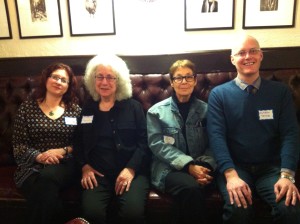Continuing with my excerpt feature, I’m posting a short passage from The Seventh Pleiade.
The Seventh Pleiade was my first novel, and naturally very close to my heart. I started writing stories about Atlantis back in 2005, but they were jumbled together in a dense, mismatched “epic,” which I thought for a while would work as interwoven past and present narratives.
The problem was those narratives were too loosely related. Gradually, what made a whole lot more sense was to isolate complete stories from the manuscript and work on a series from there. The most complete story that emerged happened to be about the last days of Atlantis, and that unexpected start to the series appealed to me.

The Seventh Pleiade is the story of a young prince Aerander who discovers a centuries-old conspiracy that is at the root of his kingdom’s demise. He’s also a young man figuring out his place in the world, and coming to terms with past wrongs to his cousin and best childhood friend Damianos, as well as the social and political pitfalls of boy-boy romances.
At readings and online venues, I’ve shared parts of the story on the ‘coming-of-age’ side. Here I thought I’d post a passage that relates to Aerander’s adventure. A brief set up: about a quarter-way into the story, Aerander goes looking for his missing cousin Damianos one night in the woods beyond the palace where they used to spend a lot of time as boys. At an ancient shrine, he stumbles into what seems to be a burrow and has to find his way out.
~ ~ ~
The ground was cold and rough like granite. He must have fallen down a hole into some sort of cavern.
But something had changed very significantly. The air was deathly still. There were none of the earthy odors of the forest, and none of its boggy humidity. Like he had been boxed up deep underground in a tomb.
Aerander sprung up on his feet and cried out for help. He stopped. There was no one in the forest to hear him. He would have to wait for daylight and hope someone would pass by the spot where he had fallen.
That was crazy. It could take days for someone to find him. Aerander’s father would be enraged when he found out his son had run off from the banquet into the woods.
Fumbling blindly, he felt an earthen wall and drew up against it. He tried to get a footing so he could climb up to the top. It was too dark to make out a workable route, and the passage seemed to be vertical. With his hands and feet, Aerander managed to raise himself a few feet, and then he slipped and landed bottom first on the floor.
His chest heaved, and his hands were slick with sweat. Shuffling around on his hand and knees, he felt around on all sides of him: one wall, two walls, three walls, and an opening in the space behind him. He wondered again how he landed there without breaking a leg. The place was unnaturally cold, as though it was packed with ice. Is that how it felt deep underground? Caverns were cold but not that cold. No matter, there was only one way to go.
Aerander crawled forward, and a few feet in, the air turned warmer. Why was that? Was there an underground spring, warm like a volcanic pool, somewhere ahead? Red light glimmered from a distance away. He figured he must be at the dead end of some sort of subterranean passageway. That meant there was another way out. He righted himself and stepped down the tunnel, eyes shifting and shoulders drawn up tight.
Somewhere further in there was a lamp, that red light, and he could use it to orient himself. He would find his way back up to the forest. What a stupid thing to do—tripping down a hole!
After twenty or so paces, the tunnel took a sharp turn, and the red light brightened the tunnel a little more. Things looked somewhat familiar: walls carved out of rock like the palace cellar where they stored wine and grain. But the place where he fell down was many stadia from the palace complex. Could there be a tunnel that stretched the whole length of the Citadel? Aerander had never heard of anything like that, but the idea was encouraging. Maybe there was a way to get back to the palace, underground, and he could sneak up through the cellar and get back to the banquet with a little story that he had taken a long walk around the grounds.
Aerander rounded the corner, stepping quietly so as not to be heard, and a few yards down he came to a metallic, arched door on one side of the tunnel. It was unusually high, like the threshold of a statehouse or a temple. At its apex, there were strange engravings. If they were letters, they were not of the Atlantean or Lemurian varieties Aerander had studied. He imagined it signified some sort of shrine, archaic like the Temple of Cleito and Poseidon, though the ancestors didn’t build temples or any kind of buildings beneath the earth to Aerander’s knowledge. Even the necropolis and the mausoleums were above the ground.
There was no knob or handle for the door. Aerander pushed against it. It was too heavy to move, or maybe it was bolted from the other side. In the dim light, he ran his hand along the surface, searching for some mechanism to open it.
The door scraped forward just enough for him to step in sideways. Had he triggered some device? The tunnel looked empty in both directions. Aerander couldn’t see all the way to the end, but it had to be quite a distance. He stepped around the door and entered the chamber.
The first thing he noticed was light coming from a single lamp hanging on a wheeled stand some yards within. The space was vast. Its walls and ceiling were entirely in shadow, but there were some three dozen pedestals, each one the size of a cot, in the center, by the lamp. Most of the pedestals were bare, but two held crude sculptures of men.
He glanced back to the door, still open, his way out if he had to make a quick escape. He wasn’t supposed to be there, but on the other hand, no one could fault him for ending up there by falling down a hole in the forest. Someone had been in the chamber recently, but no sounds were coming from the tunnel. He stepped over to one of the pedestals and examined the sculpture-thing.
It wasn’t bronze or stone but some kind of cloth. Actually, it looked as though someone had taken many long, thin cloths and wrapped them over and over, finally depicting the shape of a young man.
He reached to touch it and quickly drew his hand back. It wasn’t cloths wound up together. There was a something, someone, beneath the coverings.
 Share on Facebook
Share on Facebook





